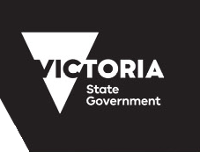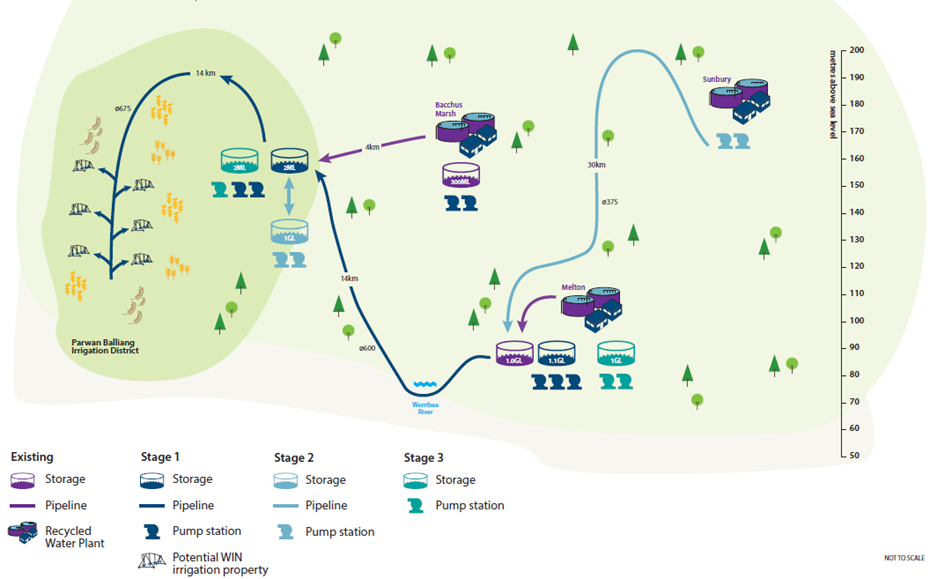From wastewater to valuable water resource
Greater Western Water is turning sewerage into a valued recycled water resource to enable the expansion of agriculture to the West of Melbourne through the Western Irrigation Network.
The west of Melbourne is significantly drier than other parts of Melbourne and has traditionally suffered from a lack of rainfall which has limited productivity and agricultural expansion in the region. Rapid urban growth in Melbourne’s west is forecast to produce billions of litres of recycled water over the coming decades. Instead of disposing this recycled water, Great Western Water will treat it to a standard that is safe for reuse. The recycled water will be supplied to farmers in and around Bacchus Marsh, Parwan and Balliang to grow food crops such as wheat and barley.
Recycled water will provide a safe, secure irrigation water supply to enable farmers to increase productivity and diversify into alternative higher value crops, generating jobs and economic growth. This environmentally friendly water supply avoids the stress that traditional irrigated agriculture has on natural waterway systems, which relies on extraction from the waterways. The use of recycled water is also a great example of a circular economy where a waste source is utilised to generate value for farmers and the community.
The Western Irrigation Network will consist of 59 km of pipelines, connecting Greater Western Water’s recycled water plants at Sunbury, Melton and Bacchus Marsh to the new irrigation district west of Melbourne. The first stage of the Western Irrigation Network is expected to be complete in late 2022 when farmers will be able to start irrigating their crops. 2,400ML of recycled water will be supplied through the network initially, and will have the capacity to increase to 18,000ML by 2050, depending on demand.
This project is Action 19 in the Werribee Integrated Water Management Forum’s Strategic Directions Statement.
Themes and Local Areas
| Primary Theme: | Water Supply and Use |
| Other Themes: | Waterways, Sustainable Agriculture, Marine Environments, Climate Change |
| Primary Local Area: | Moorabool, Melton, Wyndham & Greater Geelong |
| Other Local Areas: | Urban Melbourne, Macedon Ranges, Hume, Mitchell & Whittlesea |
| Project location: | Bacchus Marsh, Parwan, Balliang |
| Scale of the project: | Landscape |
| New or continuing work: | Building on previous work |
Project partners
| Lead organisation: | Greater Western Water |
| Key partners: | Department of Energy, Environment and Climate Action (DEECA), National Water Grid Authority |
| Registered Aboriginal Party/s relevant to the project or its area: | Bunurong Land Council Aboriginal Corporation, Wurundjeri Woi-wurrung Cultural Heritage Aboriginal Corporation, Wadawurrung Traditional Owners Aboriginal Corporation |
Investment opportunities
| Opportunities for investors within this project start from: | $$ (Tens of thousands of dollars) |
| Estimated scale of investment for full project implementation: | $$$$ (Millions of dollars) |
| Estimated timeframe for full project implementation: | 2-10 years |
Contribution toward targets
| Primary Regional Catchment Strategy target: | 1.1 Water supply and use – Adequate and stable water supplies have been secured for households, businesses, farms, Traditional Owners and the environment. Various water supply options have been effectively harnessed including stormwater harvesting, manufactured water and recycled water use. Water is shared, distributed and used efficiently by all users. |
| Relevant Biodiversity 2037 goal: | – |
| Relevant National Landcare Program priority: | – |
More information
This work is part of the program being coordinated by the Werribee Integrated Water Management Forum. https://www.water.vic.gov.au/liveable/integrated-water-management-program/forums



